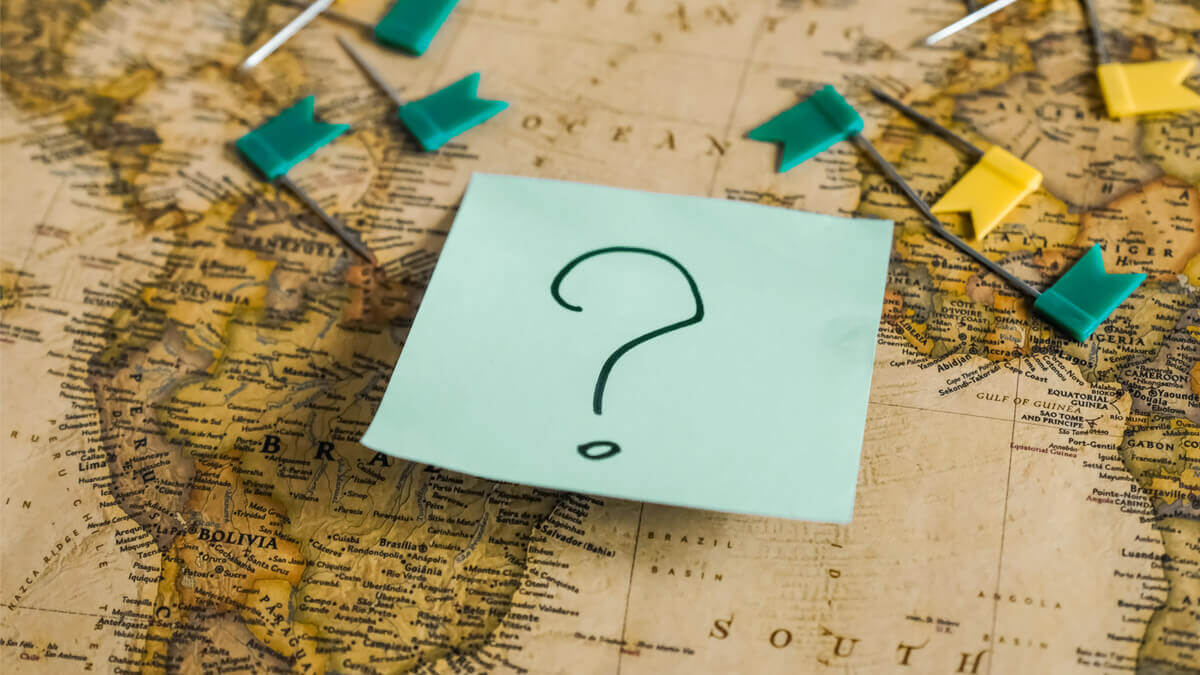Navigating the world of international movers
Planning a move overseas? Our guide helps you navigate the process of selecting the best international movers to ensure a smooth, worry-free transition to your

Considering moving abroad from the USA? You’re in the right place.
Check out our full guide to how to move overseas from America. We’ll walk through considerations and ideas, from planning where to move to settling into your new home - and even some tips for coming back to the US after your overseas adventure.
No matter where in the world you’re headed, you’ll also need easy ways to manage your money across currencies - so to help, we’ll also introduce Wise, a licensed Money Transmitter which has digital multi-currency accounts and cards that come with mid-market exchange rates and low fees from 0.43%¹.
Please see Terms of Use for your region or visit Wise Fees & Pricing for the most up to date pricing and fee information
So - how to live abroad as an American? There’s no single answer to this question, the journey you’re on will be unique to you. That said, there are some common steps you’ll need to take, no matter what you’re thinking of doing with your new life.
Here we’ll walk through some tips to plan how to move abroad from the US, with lots of resources to help your onward research.
The world is your oyster - more or less - when it comes to an international move. But so much choice can make picking even trickier.
Obviously the world is a big place, and different locations all have their own advantages and disadvantages. Researching your options is essential, but the good news is that there’s plenty of information out there to help you decide where to move from the US.
| Here are some considerations: |
|---|
|
When looking at visas, it pays to cast your net pretty wide, depending on whether you’re moving to work, study, invest, or retire - popular countries like Costa Rica and Belize can be good for retirees and investors, plus there are accessible investment visa options in some Western European countries.
If you’re moving for work, you’ll usually need a job lined up in advance. If you plan to work overseas, salary data from Teleport®³ can also be handy, offering insights into median salaries by job type, in many major global cities, so you can make sure you could afford day to day costs on a local salary.
Some great options to help you plan your budget include Numbeo.com®⁴, which aggregates cost of living information from thousands of users, looking at almost every country, and many major cities globally. This can help you compare the costs of your lifestyle in other countries compared to the US.
While every international move plan will be different, you’ll pretty much always need to think about creating a timeline and focusing on budgeting, packing, visa procedures, and hiring international movers.
One important aspect to consider is the cost of relocating internationally - including writing a complete budget covering the transition to your new life.
Once you’ve written your budget, it’s always wise to also include a buffer against unforeseen expenses - adding on an extra 10% for example, can give you the peace of mind you need to make the move that bit less stressful.
| Costs that you’ll need to think about include: |
|---|
|
Learn more about finding cheap and reliable international movers - plus, if you have pets, get our full guide to pet relocation.
Exactly what you need depends a lot on the situation, but you’ll pretty much always have to have:
- Valid passport - check the requirements about validity, as it’s common to need your passport to have 6+ months validity left at the point you apply for a visa
- Valid visa or residence permit for the country you’re heading to
- Work or study permits if required for your specific situation
The majority of the workload regarding documents usually sits around getting your visa.
| For this you’ll need a stack of supporting documents, which can include: |
|---|
|
Don’t forget to also take copies of important documents with you when you leave just in case anything gets misplaced. In some cases the best option is to get an agent to help you with your application, to make sure everything goes smoothly.
It’s important to understand any health requirements before you travel - available from the CDC⁵ - as well as getting to grips with the local healthcare system wherever you decide to go.
Health care infrastructure in other countries can be vastly different to in the US, so researching your options and making sure you have adequate insurance for your needs is essential.
Finally - get all your US health records before you travel if possible, just in case they’re needed overseas.
If you’re not living in the US — or if you simply want a more flexible account you can open from anywhere — check out Wise.
Wise isn’t a bank, but a Wise Account allows you to hold, send and receive money, as well as getting an attached debit card — plus you’ll get some extra perks which suit anyone living an international lifestyle.
You’ll be able to hold 40+ currencies, and get local bank details for up to 9 currencies including USD, to get paid easily by wire or ACH.
Wise offers linked debit cards for spending and withdrawals around the world, and all currency conversion uses the mid-market exchange rate.
That means that whenever you send a payment or spend in a foreign currency your dollars are converted with the mid-market rate with low conversion fees from 0.41%⁵. Easy.
This way to easy
international payments
Please see Terms of Use for your region or visit Wise Fees & Pricing for the most up to date pricing and fee information
Let’s walk through some of the common challenges faced by Americans relocating overseas.
Wherever you’re headed, the one thing you can be sure of is that the culture will not be the same as at home.
Most expats experience culture shock when moving, which means it takes time to settle into your new home. You can lessen this by learning about the culture before you go.
| Here are some ideas: |
|---|
|
When you move overseas you’ll be subject to the law wherever you live - which may include unfamiliar requirements and rules.
Make sure you’re very aware of how the legal system works wherever you’re headed, as there's a huge variety of laws, rules, and what can and can not be done in different locations.
Managing your money will also be a key consideration. The financial system wherever you’re headed will be different to home, so having ways to manage your money locally, and in the US, will help you settle in.
One option is to open a Wise account before you travel, which gives you access to 40+ currencies for holding and exchange, low fees, and a spending card you can use in 150+ countries - making it easier to manage your money internationally.
There are some obvious challenges you may associate with your new home, such as learning the language, getting used to the food, climate, and culture in the new place.
While you can lessen the impact of these challenges through advance research, settling in will always be a process. While the first few months may be a honeymoon period of exploring and experiencing new things, every expat has a period of finding their new country frustrating to some extent, whether that’s due to excess bureaucracy, poor weather or other issues. Bear with it, and this often passes.
Don’t underestimate the challenges on the other side of the bargain, too. Expats often end up feeling separate from US life, and experience challenges being away from family, and with no support network.
Again you can’t make these challenges disappear, but you can predict these issues in advance and put in plans to lessen the impact for you and your family.
We’ve already looked at some of the financial implications you may need to plan for in your new home. However, you might also still have some obligations and needs back home after your move.
For example, you might still have bills to pay in the US, for storage or a mortgage, or for insurance on a property you hold. Don’t forget to plan for these costs before you leave, so there are no surprises.
Bear in mind also, that you may still have US tax reporting and payment obligations when you move⁶. Get professional advice to make sure you fulfill your obligations in your new country and at home.
Unless you plan to move permanently, you’ll also have to think at some point about the transition back to the US after living overseas.
Expect to experience some level of reverse culture shock when you come back to the US. Depending on how long you’ve been away, and your level of contact with home, there may be some surprises.
Things change - so the country you left won’t be exactly the same as the one you return to. From things as simple as missing TV shows everyone is talking about, to being unaware of changes in political sentiment or similar, there will doubtless be things that catch you off guard. Be reassured this is normal - and it does pass as you settle back in.
Moving home isn’t just about the softer aspects of adjusting back to US culture - there are likely to also be legal and financial considerations, both in your previous country and back in the US.
These vary a lot depending on where you’ve been - but closing down your taxes and surrendering your visa before leaving are usually required, for example.
Here it's crucial to get advice from a professional to make sure you’ve covered all your bases - failing to do so may result in legal problems either at home or in your adopted country.
Every international move is different. Where you go, what you do and how long you stay will dictate what your move abroad from the US looks like.
Use this guide to kickstart your planning - and remember, get set up with Wise before you leave, to spend, send, hold, and exchange USD and a great selection of 40+ other currencies, almost anywhere in the world.
Sources:
Sources checked on 08.21.2023
*Please see terms of use and product availability for your region or visit Wise fees and pricing for the most up to date pricing and fee information.
This publication is provided for general information purposes and does not constitute legal, tax or other professional advice from Wise Payments Limited or its subsidiaries and its affiliates, and it is not intended as a substitute for obtaining advice from a financial advisor or any other professional.
We make no representations, warranties or guarantees, whether expressed or implied, that the content in the publication is accurate, complete or up to date.

Planning a move overseas? Our guide helps you navigate the process of selecting the best international movers to ensure a smooth, worry-free transition to your

Need to relocate your furry friend overseas? Our comprehensive guide to pet relocation offers tips, costs, and everything you need to ensure a safe journey for

Need to move your belongings overseas without breaking the bank? Explore the best and most economical methods for shipping your stuff internationally with our c

Wondering about the cost to move overseas? We'll dive into all the factors affecting international relocation costs, so you can plan your move with confidence.

If you're a US expat, a resident alien or you've moved to the US, check out this guide to know whether you're subject taxes, and find the best tips in 2024.

All you need to know about the US Foreign Tax Credit as an American expat.